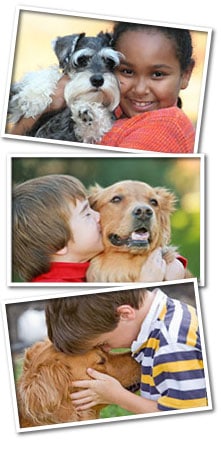The good news is that most puppies can be trained by four to six months of age.
Here’s how to do Potty Train Your Puppy:
Create a daily feeding schedule, and follow it every day.
Take your puppy outside to eliminate the first thing in the morning, the last thing at night, and after meals, playtime and naps. Your puppy needs to go outside a minimum of once per hour, every hour, every day.
When your puppy eliminates outside, give him or her lots of praise. You can also reward your puppy with extra playtime, a walk or a treat.
When you’re inside with your puppy, watch for behavior signaling that he or she might be about to go – like pacing, whining and circling. Get your puppy outside as soon as you see the warning signs.
Teach your puppy that if he or she waits by the door, you will know it’s time for him or her to go outside. Do this by pausing briefly before opening the door when you go on your regular potty breaks so your puppy will learn to associate the door with going to the bathroom.
There’s no set amount of time for how long the house training process will take. Some puppies catch on quickly. Others don’t. Your puppy must be both mentally able to recognize when it’s time to go outside, as well as physically able to hold it until he or she gets there. But the more consistency you can offer in taking your puppy outside, the more effective your house training efforts will be.
Putting your puppy in a crate overnight, or anytime during the day that he can’t be watched carefully, may help with house training. Dogs naturally avoid soiling the place where they sleep.
Choose a crate that is big enough for your puppy to stand up in and move around comfortably, but not so large that he or she can eliminate at one end and sleep at the other.
When released from the crate, your puppy will probably need to go, so take him or her outside immediately. Then when your puppy eliminates, offer a treat to reward his or her good behavior.
Remember, accidents happen, but don’t punish your puppy. That could damage your relationship and slow down the house training process. Instead, make sure to reinforce your puppy’s good behavior when he or she does take care of business outdoors.
If you catch your puppy in the act, grab his or her attention with two sharp claps. Your puppy should stop, and give you an opportunity to encourage him or her to take it outside.
And while a puppy may be house trained at your house, he or she could easily have an accident at an unfamiliar house due to the change in environment. Keep a close eye on your puppy when you go to new places, and watch for his or her warning signs.
If your puppy continues having accidents on a regular basis, there may be a medical reason. Consult your veterinarian if accidents persist to have your pet checked for blockage or other medical conditions that can cause accidents.

